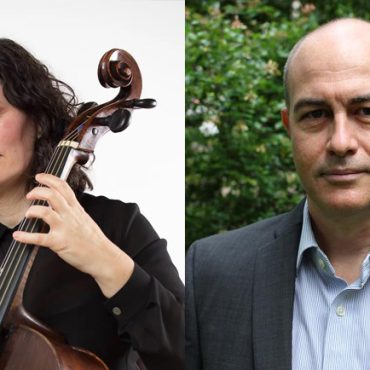
Teaching Cello Improvisation in the 18th Century: Antonio Guida’s Method
May
08
SundayCelloChat
Virtual Event
Live from L’Aquila, Italy and Austin, TX
Giovanna Barbati is an Italian cellist and viola da gamba player whose repertoire extends from early to contemporary music and who has a special interest in improvisation. She appears frequently as a soloist and has given the first performance of a number of works for solo cello, many written especially for her. As a principal cellist, she has played at the Teatro Regio in Turin, and with groups such as the Innsbrucker Festwochen Orchestra, Accademia Bizantina, Les Talens Lyriques, Il Complesso Barocco, Real Compañìa Òpera da Càmara, L’Arte del Mondo, Camerata Bern and Concerto de’ Cavalieri. On the viola da gamba she has been the continuo player in several operas, and in Bach’s Sixth Brandenburg Concerto with Andras Schiff and Cappella Barca. For many years she was principal cellist and viola da gamba player with the Academia Montis Regalis (Mondovì, Italy), with which she toured as a soloist in 2014, including performances in Paris, London and St Petersburg.
Giovanna also teaches the cello and viola da gamba and and holds workshops in historical improvisation. As part of her scholarly researches in this field she contributed the chapter ‘Il n’exécute jamais la Basse telle qu’elle est écrite’: The Use of Improvisation in Teaching Low Strings’ to the recent collected volume, edited by Fulvia Morabito, Musical Improvisation in the Baroque Era (Brepols, 2019). As an editor, she has collaborated with Guido Olivieri in the preparation of an 18th-century Neapolitan cello method, Antonio Guida: Metodo per violoncello (forthcoming for the Società Editrice di Musicologia). Together with Alessandro De Marchi she prepared for the Innsbrucker Festwochen der Alten Musik critical editions of the operas Merope by Riccardo Broschi and Idalma by Bernardo Pasquini.
A prolific recording artist, Giovanna has won numerous awards and garnered considerable critical acclaim.
Musicologist Guido Olivieri teaches history of music and directs the UT Early Music Ensemble “Austinato.” Before joining the faculty at the Butler School of Music, Olivieri has been a Research Fellow at the University of Liverpool (UK) and at The Italian Academy for Advanced Studies in America at Columbia University, and a Mellon Fellow and Visiting Assistant Professor at the University of Michigan.
His articles in scholarly journals and collective volumes have focused on the developments of string sonata in the 18th century, investigating aspects of performance practice, musical patronage, and reconstructing the cultural relationships between Naples and other European capitals. His groundbreaking research – conducted mainly on unknown archival sources and overlooked repertory – has significantly contributed to the revival of interest on Neapolitan instrumental music and musicians.
He has co-edited a volume on A. Corelli’s music and contributed entries to The New Grove Dictionary of Music, the MGG, and the Dizionario Biografico degli Italiani. Olivieri has presented at meetings of the AMS, the IMS, and the Italian Musicological Society, and has given lectures at academic institutions in the US and Europe. In Spring 2018 he was the Robert M. Trotter Visiting Distinguished Professor at the University of Oregon. He is currently president of the Society for Eighteenth-Century Music.
Olivieri has always championed the importance of making available musicological research to the general public. He has realized editions of the repertory he rediscovered and worked with international artists and ensembles specialized in early music. He has contributed to more than 10 CD projects and published the critical edition of a newly discovered manuscript sonatas by A. Corelli (Le sonate da camera di Assisi) and of two unknown cello sonatas by G. Bononcini. His current projects include the critical edition of Cimarosa’s masterwork Il matrimonio segreto (Bärenreiter).


